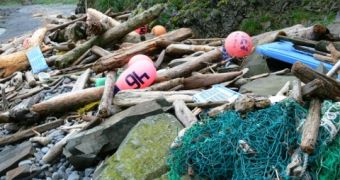It is no news that marine debris (human-produced garbage that ends up in our seas and oceans) is a great threat to most aquatic animals, and even some bird species that happen to live nearby coastlines.
Thus, not long ago we reported on how several members of NOAA (the National Oceanic and Atmospheric Administration) spent an entire month collecting nearly 50 tones of aquatic litter from the waters close to the Hawaiian Islands.
Apparently, nearly 80% of their “catch” was made up of plastics.
A study recently made public on PLoS ONE now focuses on what it is exactly that happens to a considerable amount of the marine debris that still remains floating about in international waters.
More precisely, researchers tried to determine which of these plastic materials are most likely to be eaten by various species, especially sea turtles.
Thus, they analyzed the stomach contents of 115 such animals, and found that ingestion rates differ between species.
In other words, although all said sea turtles chose to look at marine debris as an easy-to-get snack, some of them preferred soft, clear plastics, while others turned towards rubber instead.
This confirms the theory that marine creatures more often than not end up eating by-products of our modern lifestyle because they resemble their usual nutrients sources: bags and some bottles look incredibly similar to jellyfish, while rubber can be mistaken for fish.
Regardless of their dietary patterns, the research showed that each and every one of the turtles whose stomach content they analyzed had bitten into something which was not supposed to be on their usual menu.
It comes only logical that, once ingested, these materials can destroy the animals' digestive systems, and that they might even die because of this.
Moreover, marine biologists claim that some of these debris build-ups can even leak toxins, thus contributing even more to environmental pollution.
Because turtles rely first and foremost on their sense of sight when going in search of food, odds are that they cannot learn to avoid ingesting marine debris on their own.
Therefore, they need us to clean up their natural habitats and keep them – together with other countless species – out of harm's way.

 14 DAY TRIAL //
14 DAY TRIAL //